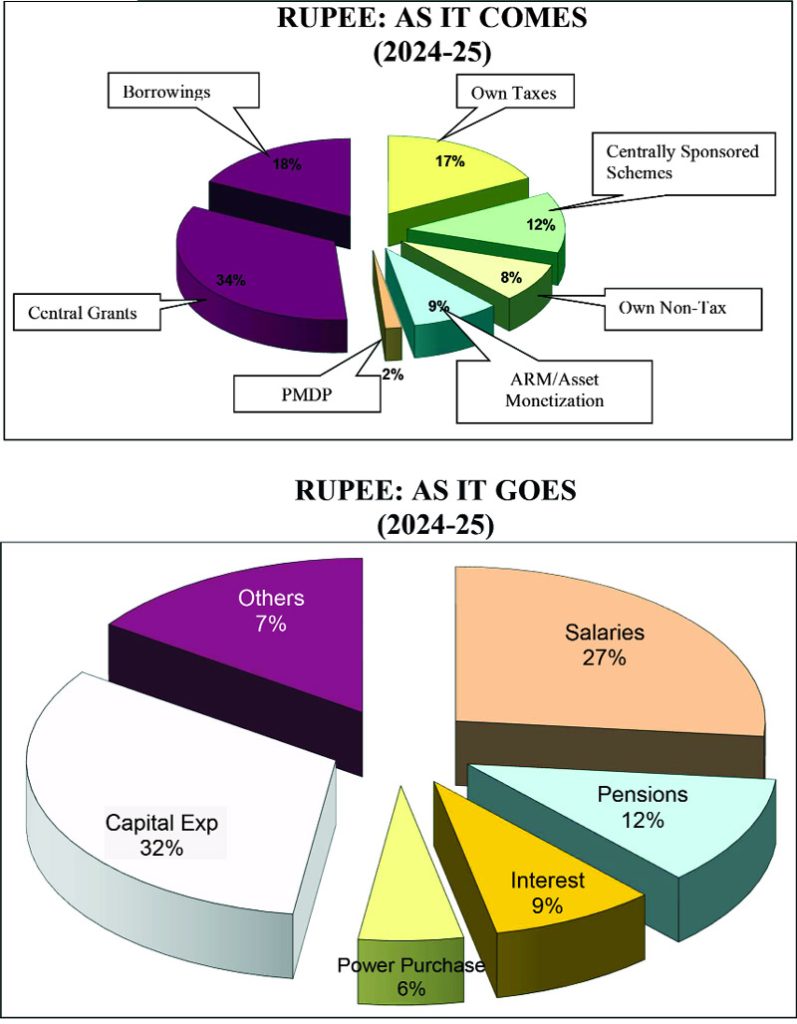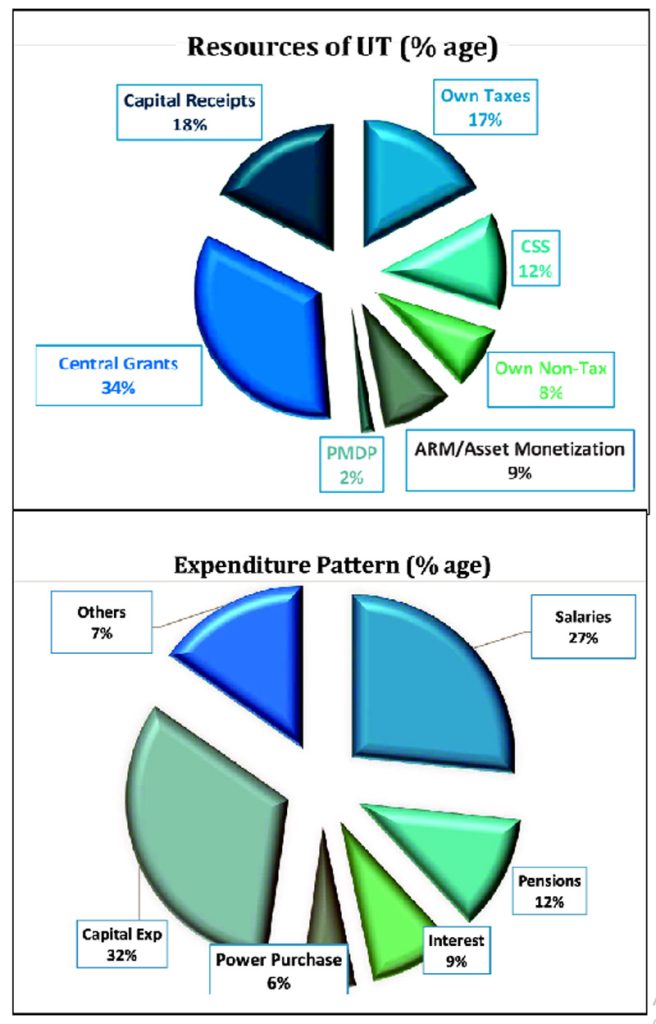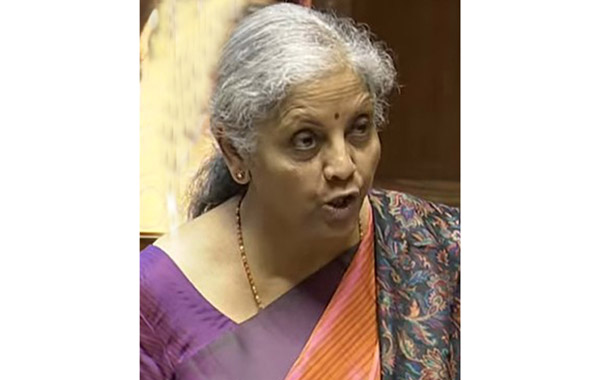UT’s economy to grow by 7.5%, revenue to go up to Rs 20,867 cr
* Path-breaking measures taken for development: Sitharaman
* 75 off-beat destinations to be developed at Intl, national levels
* AI, ML, IOT to be implemented for effective services delivery
* Work for new alignment of Shri Amarnath track undertaken by BRO
Sanjeev Pargal
JAMMU, Feb 5: Finance Minister Nirmala Sitharaman today introduced Rs 59, 364 crore interim budget for Jammu & Kashmir in Lok Sabha while the budget estimates for next financial year of 2024-25 are expected to be Rs 1,18,728 crore as against Rs 1,18,500 crore for current fiscal year. Interim budget will be debated in Lok Sabha and Rajya Sabha between February 7 and 9 before getting nod of the Parliament.
The interim budget also called as the Vote-on-Account proposed sufficient grants for tourism, Kashmiri Pandits including employees, Panchayati Raj Institutions (PRIs), power projects, new colleges/Universities, women empowerment including Ladli Beti Scheme, Industrial Estates and construction of new houses under PM Awas Yojana.
The budget focused on nine major points including good governance, strengthening grassroots democracy, boosting holistic and sustainable agriculture, promoting Jammu and Kashmir as an investment destination, employment generation, developing new tourism destinations, accelerated development and inclusive growth, women empowerment and social inclusion.
The budget proposed an allocation of Rs 1284.45 crore for 2024-25 on security related activities and Rs 2029.95 crore for agriculture and allied sectors, Rs 500.89 crore more than revised allocation of 2023-24. The rural sector has been given Rs 3730 crore under capital expenditure for the next financial year. Tourism sector got Rs 357.70 crore, an increase of Rs 103.95 crore from current fiscal year. Health and Medical Education has been sanctioned Rs 1427.61 crore.
 School and Higher Education sector secured Rs 1300.10 crore for 2024-25, up by Rs 201.32 crore from this year while Rs 1067.61 crore have been allocated for relief and rehabilitation of Kashmiri migrants under both revenue and capital expenditure, again an increase of Rs 134.68 crore. Power sector received an allocation of Rs 1875 crore for capital expenditure, a hike of Rs 552.61 crore and Jal Shakti Department was allocated whopping Rs 5038.74 crore. Housing and Urban Development Department too got Rs 2329.55 crore while Roads and Bridges were given Rs 4108.87 crore. Industries and Commerce secured Rs 529.62 crore.
School and Higher Education sector secured Rs 1300.10 crore for 2024-25, up by Rs 201.32 crore from this year while Rs 1067.61 crore have been allocated for relief and rehabilitation of Kashmiri migrants under both revenue and capital expenditure, again an increase of Rs 134.68 crore. Power sector received an allocation of Rs 1875 crore for capital expenditure, a hike of Rs 552.61 crore and Jal Shakti Department was allocated whopping Rs 5038.74 crore. Housing and Urban Development Department too got Rs 2329.55 crore while Roads and Bridges were given Rs 4108.87 crore. Industries and Commerce secured Rs 529.62 crore.
The interim budget was necessitated because of Lok Sabha elections in April-May. Full budget of the UT will be presented by the next Government in June-July. Since 2020, J&K’s budgets are being presented in the Parliament as J&K was under President and Governor’s Rule from June 2018 to August 5, 2019 when it was bifurcated into two UTs of J&K and Ladakh.
The budget documents revealed that the total receipts in respect of the proposed VoA for 2024-25 are estimated at Rs 59,364 crore, excluding the provision for Ways and Means advances of Rs 16,568 crore. These receipts in respect of the VoA for 2024-25 include Rs. 48,930 crore as revenue receipts and Rs. 10,434 crore as capital receipts.
Significantly, Jammu and Kashmir’s own revenue has been estimated at Rs 20,867 crore.
According to the documents, the total gross receipts in respect of proposed VoA for 2024-25 are estimated at Rs 75,932 crore, including the provision for Ways and Means advances of Rs 16,568 crore.
The Parliament’s approval has been sought only for Rs 75,932 crore, including the provision for Ways and Means advances of Rs 16,568 crore. After excluding the provision of Ways and Means advances, the total net expenditure is estimated to be Rs 59,364 crore including capital expenditure of Rs 19,283 crore and estimated revenue expenditure of Rs 40081 crore.
Presenting supplementary grants for current financial year 2023-24, Sitharaman said the original budget was Rs 1,18,500 crore but revised estimates are of the order of Rs 1,08,197 crore excluding Ways and Means advance provisions. Expected revenue receipts are Rs 84,603 crore and capital receipts are Rs 23,594 crore. Similarly, the revenue expenditure is estimated to be Rs 76,155 crore and capital expenditure to be Rs 32,042 crore.
The UT’s full budget would be presented once the new Government is elected in the 2024 general elections and it is estimated to be Rs 1,18,728 crore excluding the provision for Ways and Means advances.
The revenue expenditure is estimated to be Rs. 80,162 crore and capital expenditure to be Rs. 38,566 crore.
The interim Budget envisaged a fiscal deficit of Rs 20,760 crore and a 7.5 per cent growth in Gross State Domestic Product (GSDP). The tax/GDP ratio is projected at 7.84 percent for 2024-25 which is higher than the previous year of 6.56 percent. Debt/GDP ratio for 2024-25 is 51 percent. GDP for the year 2024-25 has been projected at Rs 2,63,399 crore which shows a growth of 7.5 percent over the previous year.
The capital expenditure for the fiscal has been proposed at Rs 38,566 crore, which is 14.64 per cent of the GSDP, as per the interim Budget tabled by Sitharaman in Parliament.
The revenue receipts for the next fiscal stood at Rs 97,861 crore.
Jammu and Kashmir will be spending Rs 12,580 crore as revenue and Rs 1361 crore on capital in Administrative sector while there will be Rs 24,599 crore Revenue expenditure and Rs 3779 crore Capital expenditure in Social sector. On economic front, the UT will have Rs 5306 crore revenue and Rs 6853 crore capital expenditure. In infrastructure sector, J&K will have Rs 12,675 crore revenue and Rs 13,511 crore capital expenditure.
The budget said e-office will be extended in all offices and Panchayats while physical verification units will be set up in Jammu and Srinagar. It added that emerging technologies such as Artificial Intelligence (AI), Machine Learning (ML) and Internet of Things (IOT) will be implemented for effectively delivery of services to the citizens by the Information Technology Department.
 According to Sitharaman, the crucial reforms undertaken in 2019 enabled “path-breaking” measures by the Union Territory Government to decentralize governance structure, promote inclusive development, upscale revenue generation and step up infrastructure development.
According to Sitharaman, the crucial reforms undertaken in 2019 enabled “path-breaking” measures by the Union Territory Government to decentralize governance structure, promote inclusive development, upscale revenue generation and step up infrastructure development.
“The Government is maintaining law and order to ensure security while simultaneously implementing initiatives for economic and social development. The Government has adopted a policy of zero tolerance against terrorism,” Sitharaman said.
Security forces are taking effective and continuous action in countering terrorism.
Due to the effective measures and efforts taken, the security scenario in Jammu and Kashmir has significantly improved, she added.
Sitharaman said the railway link between Jammu to Srinagar is being constructed in full swing and Kashmir is expected to be rail-connected to rest of the country in the year 2024. World’s highest rail bridge has been constructed on river Chenab, she added.
The budget proposed a handsome amount of Rs 450 crore for raising infrastructure of new Colleges and Universities as per National Education Policy (NEP) vision. It also has a provision of Rs 400 crore for construction of transit accommodations for Kashmiri Pandit employees and an equal amount for development of Industrial Estates and related infrastructure.
There is a provision of Rs 430 crore for women empowerment intervention of Ladli Beti and Marriage Assistance Scheme, Rs 272 crore for District Development Councils (DDCs) and Block Development Councils (BDCs) for improving local governance at district and block levels, Rs 100 crore for conclusion of World Bank funded Jhelum Tawi Flood Recovery Project, Rs 660 crore for J&K’s equity for hydro electric projects at Ratle, Kwar and Kiru in Kishtwar district, Rs 80 crore for DDC/BDC/PRI accommodation and offices as also for security arrangements of the representatives and Rs 91 crore for new tourism destinations, new circuits, Sufi circuit and identified religious circuits, ropeways, highway resting places and promotion of Golf.
On security front, the budget proposed construction of new Border Police Posts, installation of CCTV cameras and strengthening Police Stations/Police Posts.
The budget documents revealed that Jammu and Kashmir has identified 75 off-beat destinations for development and promotion at international, national and local levels. Funding for basic amenities has been earmarked for 10 destinations in Jammu and Kashmir divisions while 75 heritage sites have been identified and a special scheme for revival, restoration, preservation and maintenance of architecture and heritage launched.
“Work for development of new alignment and restoration and improvement of existing tracks leading to holy cave shrine of Shri Amarnath Ji has been undertaken through the Border Roads Organisation (BRO). This work has substantially improved the access, safety and convenience for the pilgrims and rejuvenated local tourism,’’ the budget papers said and added that Tourist Information Centre has been built in Gurez to promote border tourism.
The budget further said that the Cancer Institute at Jammu is being operationalized.
On electricity front, the budget documents revealed that ongoing fiscal year has witnessed improvement in power loss reduction and increase in revenue generation.
“All the rural households will be provided tap water under Jal Jeevan Mission (JJM) to ensure 100 percent universal water coverage to rural households,’’ the budget said, adding the digitization of consumer records has been completed and online billing system is now operational in Srinagar and Jammu cities.
The budget documents revealed that the J&K Government has received investment proposals worth Rs 90182 crore and investment worth Rs 5319 crore has been grounded in the Union Territory since 2019-20.
“investment proposals worth Rs 90182 crore were received which have potential to generate employment for 4, 01,965 youth. Since 2019-20, an investment worth Rs 5319 crore has been grounded,” the documents said.
The Union Territory Government has launched the Jammu & Kashmir Industrial Policy 2021-30 with the aim to attract new investment, create employment opportunities for youth, develop backward regions and expand existing industrial units.
In a move to woo investors, it has also notified the Industrial Land Allotment Policy 2021-30, Private Industrial Estate Development Policy 2021-30, Wool Processing, Handicrafts and Handloom Policy 2020.
The GoI also revealed that apart from the existing 64 industrial estates, 46 estates are being developed to fulfill the goal of ‘Made in Jammu and Kashmir’.
“46 new Industrial Estates have been identified for development that will attract investment and create employment opportunities,” the budget documents stated.
According to the documents, Jammu and Kashmir emerged as the top ranking Union Territory of India in the 2022 Export Ranking.
“The Union Territory improved its ranking from 35 in 2020 to 17 in 2022,” the budget documents revealed.
The Centre also revealed that Handloom and Handicraft exports have doubled from Rs 563 crore in 2021-22 to Rs 1116 crore in 2022-23.
* Relief, Rehab of KPs to get boost with Rs 1067 cr allocation.
* e-office to be extended in all offices, Panchayats.
* Physical verification units to be set up in Jammu, Srinagar.
* Women empowerment with Ladli Beti, Marriage Assistance.
* DDCs, BDCs get funding for accommodation, offices
* Special scheme for revival, restoration of heritage sites.
* Gurez to be promoted as border tourism desitnation.
* Improvement in power losses, increase in revenue.
* All rural households to get tap water.
* Police Stations/Police Posts to be strengthened.
* Kashmir to be connected by rail this year.
* New Colleges/Universities to raise infra as per NEP.
Highlights
*Rs 2959 cr for tap-water connectivity for rural areas.
*Rs 1907 cr for school education infrastructure and services.
*Provision of improving road connectivity with Rs 1683 cr for PMGSY roads.
*Rs 1313 cr for strengthening decentralized governance by providing for local area works of Panchayat and Urban Local Bodies.
*Rs 1093 cr for rural housing under PM AwasYojana-Grameen scheme.
*Rs 1000 cr for for old aged, widow and disabled pensions.
*Rs 660 cr for J&K’s equity for the hydro electric projects at Ratle, Kwar, Kiru.
*Rs 500 cr for capitalization of the banks, including Cooperative Banks, Rural Banks, J&K Bank, etc.
*Rs 370 cr under Swachh Bharat Abhiyan (Urban) scheme.
*Rs 390 cr for Flood Management Project of River Jhelum.
*Rs 450 cr for GST re-imbursement to ensure timely reimbursement of the claims.
*Rs 272 cr for DDC/BDC grants improving local governance at district and block levels.
*Rs 174 cr for development of model schools under PM-Shri scheme.
*Rs 140 cr for creation of sports infrastructure
*Rs 100 cr for conclusion of World Bank funded Jhelum Tawi Flood Recovery Project.
*Rs 100 cr for Mission Youth programmes for education, skilling, and employment.
*Rs 100 cr for heritage preservation,
*Rs 91 cr for new tourism destinations, new circuits, Sufi circuit and identified religious circuits, ropeways, highway resting places and promotion of Golf.
*Rs 70 cr for development of new Townships and affordable housing and Rs 50 cr for Dal development.
*Rs 40 cr for tourism promotion, Rs 15 cr for the festival promotion and for promotion of cinema/ threatre.
*Rs 80 cr for establishment of DDC/BDC/PRI accommodation and offices as also for security arrangements of DDC/BDC/PRI representatives.
*Rs 59 cr for construction of Police Housing colony and relief and rehabilitation
*Rs 45 cr for construction of bunkers and for digitization and CCTVs in Police Stations
*Rs 30 cr for improving Quality in Schools, School Infrastructure, for Career Counseling and for introduction of additional Streams in Schools.
*Rs 5 cr for replacement of old fleet in transport sector.


